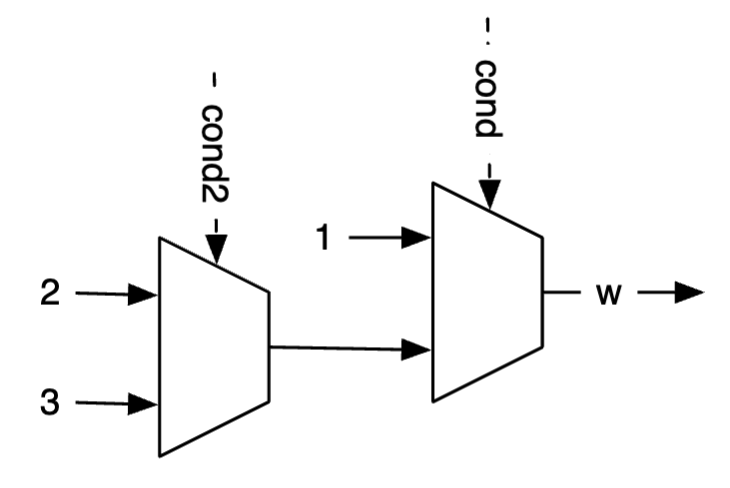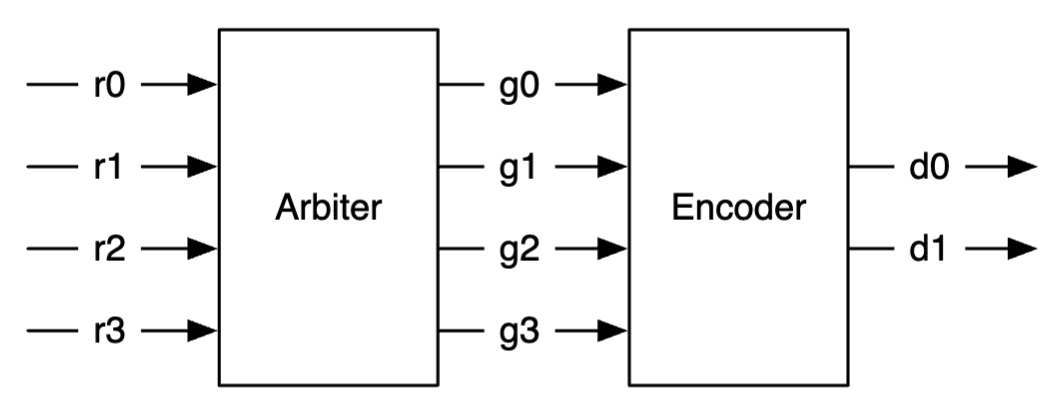Combinational Building Blocks
val 不可重新赋值
val 无法用=, :=重新赋值
要表达Mux, 需使用Wire
When¶
when生成 Mux:
val w = Wire(UInt())
w := 0.U
// val w = WireDefault(0.U) // assign default value for complex circuit
when (cond) {
w := 1.U
}

elsewhen
elsewhen可接无数个
当所有条件与某个变量相关时,最好使用switch
Switch¶
switch生成 decoder:
result := 0.U // always need to assign default value
switch(sel) {
is (0.U) { result := 1.U }
is (1.U) { result := 2.U }
is (2.U) { result := 4.U }
is (3.U) { result := 8.U }
}
switch(sel) {
is ("b00".U) { result := "b0001".U }
is ("b01".U) { result := "b0010".U }
is ("b10".U) { result := "b0100".U }
is ("b11".U) { result := "b1000".U }
}
result := 1.U << sel
Encoder¶
小Encode¶
b := "b00".U // assign default value
switch (a) {
is ("b0001".U) { b:= "b00".U }
is ("b0010".U) { b:= "b01".U }
is ("b0100".U) { b:= "b10".U }
is ("b1000".U) { b:= "b11".U }
}
循环¶
硬件生成器¶
val v = Wire(Vec(16, UInt(4.W)))
v(0) := 0.U
for (i <- 1 until 16) {
v(i) := Mux(hotIn(i), i.U, 0.U) | v(i - 1)
}
val encOnt = v(15)
- 向量v的每个元素在对应的整数值和0中选择,选择信号为输入hotIn的对应位
- 对向量v做约化,求或相当于求前缀或,约化结果为
v(15)
生成结果
module Encoder(
input clock,
reset,
input [15:0] io_hotIn,
output [3:0] io_encOut
);
wire [2:0] _v_5_T_1 = io_hotIn[5] ? 3'h5 : 3'h0;
wire [2:0] _v_6_T_1 = io_hotIn[6] ? 3'h6 : 3'h0;
assign io_encOut =
{4{io_hotIn[15]}} | (io_hotIn[14] ? 4'hE : 4'h0) | (io_hotIn[13] ? 4'hD : 4'h0)
| (io_hotIn[12] ? 4'hC : 4'h0) | (io_hotIn[11] ? 4'hB : 4'h0)
| (io_hotIn[10] ? 4'hA : 4'h0) | (io_hotIn[9] ? 4'h9 : 4'h0)
| {io_hotIn[8],
io_hotIn[7] | _v_6_T_1[2] | _v_5_T_1[2] | io_hotIn[4],
{2{io_hotIn[7]}} | _v_6_T_1[1:0] | _v_5_T_1[1:0] | {2{io_hotIn[3]}}
| io_hotIn[2:1]};
endmodule
优先仲裁器¶
- 优先放行低位信号
- 每次只放行一个信号
小仲裁器¶
val grant = VecInit(false.B, false.B, false.B)
val notGranted = VecInit(false.B, false.B)
grant(0) := request(0)
notGranted(0) := !grant(0)
grant(1) := request(1) && notGranted(0)
notGranted(1) := !grant(1) && notGranted(0)
grant(2) := request(2) && notGranted(1)
val grant = WireDefault("b000".U(3.W))
switch (request) {
is ("b000".U) { grant := "b000".U }
is ("b001".U) { grant := "b001".U }
is ("b010".U) { grant := "b010".U }
is ("b011".U) { grant := "b001".U }
is ("b100".U) { grant := "b100".U }
is ("b101".U) { grant := "b001".U }
is ("b110".U) { grant := "b010".U }
is ("b111".U) { grant := "b001".U }
}
硬件生成器¶
val grant = VecInit.fill(n)(false.B)
val notGranted = VecInit.fill(n)(false.B)
grant(0) := request(0)
notGranted(0) := !grant(0)
for (i <- 1 until n) {
grant(i) := request(i) && notGranted(i - 1)
notGranted(i) := !grant(i) && notGranted(i - 1)
}
module Arbiter(
input clock,
reset,
input [2:0] io_request,
output [2:0] io_grant
);
wire grant_1 = io_request[1] & ~(io_request[0]);
assign io_grant = {io_request[2] & ~grant_1 & ~(io_request[0]), grant_1, io_request[0]};
endmodule
优先编码器
优先编码器 = 仲裁器 + 编码器
